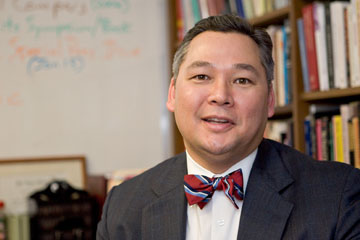By Cheryl Walker
Wake Forest University News Service [United States]
January 9, 2006
http://www.wfu.edu/wfunews/2006/010906y.html
The Catholic Church plays an increasingly important role in state politics, according to a new book by Wake Forest University sociologist David Yamane.
"The Catholic Church in State Politics," published by Rowman and Littlefield, documents how conferences of Catholic bishops in 33 states and Washington, D.C., bring the church's theology into the legislative arena as they lobby on major issues such as abortion, capital punishment, education, health care and same-sex marriage.
Despite their importance among religious lobbying organizations at the state level, these bishops conferences operate effectively out of the public spotlight.
 |
| David Yamane |
"A major goal of this book is to divulge the secret that is the state Catholic conferences," Yamane says. "It does so by examining their history and organization, the issues they engage, their bases of legitimacy, and how they bring their religious arguments into the public square."
Among the book's key findings is that the clergy sexual abuse scandal - the "Catholic Watergate" of 2002 - did not significantly or uniformly diminish the political influence of state Catholic conferences.
This is because the lay people who staff and run the conferences have bases of political legitimacy in the state legislatures that are independent of the bishops' moral authority, Yamane says.
Yamane also shows how state Catholic conferences negotiate the prophetic demands of faith and the realities of a pluralistic, secular society. Although they do not forgo religious arguments altogether, they frequently bundle them with secular arguments, attempting to persuade legislators by casting a wider net, he says.
"David Yamane's book is an extraordinary, subtle and intelligent analysis of a complex matter," writes best-selling author Andrew Greeley. "It demonstrates conclusively that by and large the state Catholic conferences have worked out a way of representing religion in the public marketplace with skill, intelligence and balance."
"In the end," Yamane concludes, "state Catholic conferences are welcomed into the state legislative arena because they play by the secular rules of the political game and they succeed to the extent that they play by those rules."
Yamane, an assistant professor of sociology, joined the Wake Forest faculty in 2005. He focuses on the sociology of religion and postwar American Catholicism and edits the academic journal, "Sociology of Religion: A Quarterly Review." Yamane is also the author of "Student Movements for Multiculturalism," co-author of "Real Stories of Christian Initiation," and editor of "Goodbye Father: The Celibate Male Priesthood and the Future of the Catholic Church."
Any original material on these pages is copyright © BishopAccountability.org 2004. Reproduce freely with attribution.